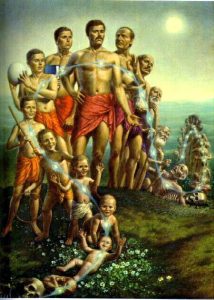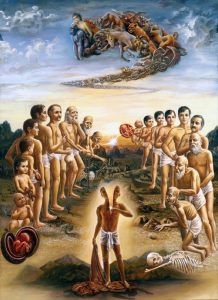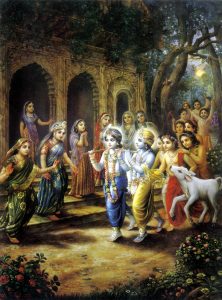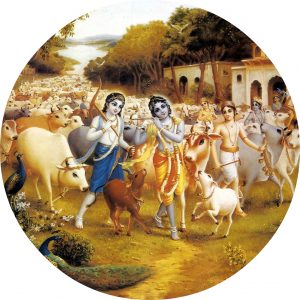 Śrīla Bhaktivedānta Nārāyaṇa Mahārāja: In the Bhagavad-gītā, Śrī Kṛṣṇa has spoken of four kinds of knowledge: guhya (confidential), guhyatara (more confidential), guhyatama (still more confidential), and sarva-guhyatama (most confidential). Can you explain these four kinds of knowledge? (To Dāmodara Mahārāja) Do you know?
Śrīla Bhaktivedānta Nārāyaṇa Mahārāja: In the Bhagavad-gītā, Śrī Kṛṣṇa has spoken of four kinds of knowledge: guhya (confidential), guhyatara (more confidential), guhyatama (still more confidential), and sarva-guhyatama (most confidential). Can you explain these four kinds of knowledge? (To Dāmodara Mahārāja) Do you know?
Śrīpāda Dāmodara Mahārāja: Guhya is knowledge of the ātmā.
Śrīla Bhaktivedānta Nārāyaṇa Mahārāja: Can you quote any ślokas (Sanskrit verses) to explain this?
Śrīpāda Dāmodara Mahārāja: There are so many.
Śrīla Bhaktivedānta Nārāyaṇa Mahārāja: Can you quote one of them?
Śrīpāda Dāmodara Mahārāja:
dehino ‘smin yathā dehe
kaumāraṁ yauvanaṁ jarā
tathā dehāntara-prāptir
dhīras tatra na muhyati
(Bhagavad-gītā 2.13)
As the embodied soul continuously passes, in this body, from boy hood to youth to old age, the soul similarly passes into another body at death. A sober person is not bewildered by such a change.
Śrīpāda Mādhava Mahārāja:
nainaṁ chindanti śastrāṇi
nainaṁ dahati pāvakaḥ
na cainaṁ kledayanty āpo
na śoṣayati mārutaḥ
(Bhagavad-gītā 2.23)
The soul can never be cut to pieces by any weapon, nor burned by fire, nor moistened by water, nor withered by the wind.
Śrīla Bhaktivedānta Nārāyaṇa Mahārāja: Also:
vāsāṁsi jīrṇāni yathā vihāya
navāni gṛhṇāti naro ‘parāṇi
tathā śarīrāṇi vihāya jīrṇāny
anyāni saṁyāti navāni dehī
(Bhagavad-gītā 2.22)
As a person puts on new garments, giving up the old ones, the soul similarly accepts new material bodies, giving up the old and useless ones.
So the body is not the soul. This is guhya. And what is general knowledge? In the Bhagavad-gītā, Arjuna lamented, “I will kill them. They will die.”
Śrīpāda Mādhava Mahārāja: “I am the doer.”
Śrīla Bhaktivedānta Nārāyaṇa Mahārāja: “We are this body. I cannot fight for this kingdom.” This is general knowledge. Greater than this general knowledge is the understanding that no one can kill the soul. This is guhya, confidential knowledge.
And second? Who will answer? Jīva, can you answer?
Śrīpāda Dāmodara Mahārāja: Paramātmā-tattva.
Śrīla Bhaktivedānta Nārāyaṇa Mahārāja: What is the śloka? Where is Prema?
Śrīpāda Padmanābha Mahārāja: Guhyatara is more confidential knowledge; the knowledge that Śrī Kṛṣṇa is the Supreme Personality of Godhead.
Śrīla Bhaktivedānta Nārāyaṇa Mahārāja: Prema? What is it?
Prema-prayojana dāsa: Kṛṣṇa said in Gītā:
īśvaraḥ sarva-bhūtānāṁ
hṛd-deśe ’rjuna tiṣṭhati
bhrāmayan sarva-bhūtāni
yantrārūḍhāni māyayā
(Bhagavad-gītā 18.61)
The Supreme Lord is situated in everyone’s heart, O Arjuna, and is directing the wanderings of all living entities, who are seated as on a machine, made of the material energy.
Guhyatara is the knowledge that Īśvara, the Supreme Lord, is situated in the hearts of all living entities who are as if situated on a machine made of material energy, and is causing them to wander in this material world. Kṛṣṇa is telling Arjuna, “Arjuna, you should surrender unto Him.” Śrī Kṛṣṇa said, “Tam eva śaraṇaṁ gaccha – Surrender unto Him,” because He wants to separate the knowledge of Paramātmā from knowledge of His form as Bhagavān (the Supreme Personality of Godhead).
Śrīla Bhaktivedānta Nārāyaṇa Mahārāja: Knowledge of Paramātmā is guhyatara. And third?
Śrīpāda Mādhava Mahārāja: Guhyatama.
ahaṁ sarvasya prabhavo
mattaḥ sarvaṁ pravartate
iti matvā bhajante māṁ
budhā bhavā-samanvitāḥ
(Bhagavad-gītā 10.8)
I am the source of all spiritual and material worlds. Everything emanates from Me. The wise who perfectly know this engage in My devotional service and worship Me with all their hearts.
Śrīla Bhaktivedānta Nārāyaṇa Mahārāja: Kṛṣṇa says, “I am superior to the jīvas and also superior to Brahman (the impersonal aspect of the Absolute Truth).” In the eleventh and thirteenth chapters it is therefore said that He is Puruṣottama (the Supreme Personality of Godhead). This is the third, puruṣottama-jñāna (guhyatama). And fourth?
Śrīpāda Padmanābha Mahārāja: Sarva-guhyatama, the most confidential knowledge – all living entities should surrender to Him fully.
man-manā bhāva mad-bhakto
mad-yājī māṁ namaskuru
mām evaiṣyasi yuktvaivam
ātmānaṁ mat-parāyaṇaḥ
(Bhagavad-gītā 18.65)
Always think of Me, become My devotee, worship Me and offer your homage unto Me. Thus you will come to Me without fail. I promise you this because you are My very dear friend.
Śrīla Bhaktivedānta Nārāyaṇa Mahārāja: What is the real tattva (deep truth) in this verse? Puruṣottama cannot perform such sweet pastimes as Kṛṣṇa performs. By the words man-mana bhāva, Kṛṣṇa refers to Himself as that personality who performs sweet pastimes in Vṛndāvana, Mathurā, and in Dvārakā. He reminds Arjuna, “I am that Kṛṣṇa.” He is indicating, “You should remember those sweet pastimes of My boyhood in Vraja.” This is the most confidential knowledge.
confidential knowledge.
Regarding this verse, I previously explained the pastime of a gopī who had recently moved to Nandagrāma. She had heard about Kṛṣṇa and wanted to see Him. One day, as Kṛṣṇa was playing His flute and returning home with millions of cows and calves and cowherd friends, He considered, “A new girl has come and she wants to see Me. Her mother-in-law did not allow her to leave the house.” Her mother-in-law had told her, “Don’t go, otherwise a black snake will bite you.” That gopī had replied, “Then why are you going? I must go, even if you expel me from your house.” She went out, Kṛṣṇa touched her chin with His flute, and she became maddened.
Śrīpāda Mādhava Mahārāja: General knowledge is that we are this body; confidential knowledge (guhya) is that we are the soul; more confidential knowledge (guhyatara) is paramātmā-tattva; the most confidential knowledge (guhyatama) is puruṣottama-tattva; and the supermost confidential knowledge (sarva-guhyatama) is aprākṛta-tattva, Śrī Kṛṣṇa in Vraja.
Śrīpāda Dāmodara Mahārāja: Puruṣottama means Nārāyaṇa?
Śrīla Bhaktivedānta Nārāyaṇa Mahārāja: Yes, Nārāyaṇa in Vaikuṇṭha.
I have explained all these tattvas in the introduction to the Gītā. This is the idea of Śrīla Bhaktivinoda Ṭhākura. Śrī Kṛṣṇa has told everything in Gītā, but in a brief and a hidden way. Therefore it is said that the primary book is Gītā and the post-graduate study is Śrīmad-Bhāgavatam.
Śrīla Bhaktivedānta Nārāyaṇa Mahārāja: In the Bhagavad-gītā, Kṛṣṇa spoke of four kinds of knowledge: guhya (confidential), guhyatara (more confidential), guhyatama (still more confidential), and sarva-guhyatama (most confidential). The first is guhya, which is ātma-jñāna, or knowledge that we are not this body. Second is guhyatara, which is paramātmā-tattva-jñāna, or knowledge that Kṛṣṇa in His feature as Paramātmā resides everywhere. Third is guhyatama, which is bhagavān-jñāna, or knowledge of the Supreme Lord as the Supreme Controller. And fourth is sarva-guhyatama, the most confidential knowledge, which is that Vrajendra-nandana Śrī Kṛṣṇa is the cause of all causes and all that is.
Devotees offer everything to Kṛṣṇa:
man-manā bhava mad-bhakto
mad-yājī māṁ namaskuru
mām evaiṣyasi satyaṁ te
pratijāne priyo ’si me
(Bhagavad-gītā 18.65)
[Offer your mind to Me, become My devotee by hearing, chanting, and so forth about My names, forms, qualities, and pastimes; worship Me, and offer obeisances to Me. In this way, you will certainly attain Me. I promise you this truthfully because you are most dear to Me.]
What is the meaning of man-manā bhava? Śrī Kṛṣṇa is saying, “Give your mind and heart to Me.” How? Here is an example. A newly married gopī girl came to reside in Nandagaon, where her new mother-in-law instructed her, “Be careful of the black serpent, Kṛṣṇa. He may bite you. If you see Him and behold His beauty, your heart will be attracted to Him forever. You will be forced to give Him your heart and your entire self. So, don’t go to see Him.”
One day, Kṛṣṇa was passing by with His cowherd boyfriends and millions of cows. That newly married girl heard  Kṛṣṇa’s flute, and at once wanted to go to a window or door to see Him. Her mother-in-law told her, “Don’t go. That black serpent will bite you, and you will never be cured.”
Kṛṣṇa’s flute, and at once wanted to go to a window or door to see Him. Her mother-in-law told her, “Don’t go. That black serpent will bite you, and you will never be cured.”
The daughter-in-law replied, “Your daughter and all the other Vrajavāsīs are going to see Him. Why are you yourself going? Even if you expel me from your house, I must go to see Him.”
Thus she went to the door and saw Kṛṣṇa, who knew her heart. He at once held onto the tail of a calf, which then ran right to her door. He touched her with His flute, and she immediately became stunned.
Her mother-in-law then approached her and said, “What are you doing here? I warned you, but you didn’t listen to me.” Her mother-in-law then brought her inside and told her, “You should churn yogurt. Bring the pot of yogurt from inside, and start churning.” But that young gopī was so absorbed in Kṛṣṇa that instead of bringing the yogurt pot, she brought a pot of mustard seeds and began to churn them. Again her mother-in-law came and said, “What are you doing? You don’t follow my orders. You must follow.”
Trying to find a way to cure the girl’s problem, her mother-in-law considered that if she would tell her to bring water from a faraway well, this may take her mind off Kṛṣṇa. Thus, after ordering her to go, she gave her one pitcher, and then another. She also gave her a baby to carry, along with a rope and bucket.
The newly married gopī went to the well, but she kept the pitcher aside. Having no external awareness at all, instead of tying the rope around the pitcher, she tied it around the baby and began to lower the baby into the well. Some gopīs nearby saw her, and one of them exclaimed, “What has become of her? Has she become haunted by a ghost?” Another gopī replied, “She is not possessed by a ghost. It is the son of Nanda Mahārāja who has possessed her mind.” They saved the baby and she returned home, but she could not bring her heart home with her for it had gone with Kṛṣṇa. This is the meaning of man-manā bhava.
Give your heart and mind to Kṛṣṇa. If you cannot do that, then mad-yājī māṁ namaskuru – worship Him and offer Him obeisances. Kṛṣṇa told Arjuna to engage his mind in Him, to perform śravaṇa, kīrtana, and smaraṇa. Arjuna explained that he could not do that on the battlefield. So Kṛṣṇa told him that he could simply offer praṇāma to Him, and declared, “I will liberate you.” Hare Kṛṣṇa.
Kṛṣṇa has given us a chance; He has given us this human form of life. If you fail to perform bhakti in this life, you will lose hundreds of thousands of lifetimes. Kṛṣṇa is very merciful. He cannot tolerate the suffering of the living entities, so He has given His holy name. He has invested all of His power, mercy, and qualities in His name. The  holy name is non-different from Him. It is not a worldly thing that will give only gold or other such things. It can bestow something millions of times more than money can give; but we have no taste for it. Our version of ‘bhajana’ is not sufficient.
holy name is non-different from Him. It is not a worldly thing that will give only gold or other such things. It can bestow something millions of times more than money can give; but we have no taste for it. Our version of ‘bhajana’ is not sufficient.
You will have to give your whole energy. If you are not giving your whole energy, then give part of your energy; but if you only give part, it may take a long time to advance. If you give your energy fully, you will very soon enjoy success.
Yaśodānanda is giving partly. How is he giving? He is helping so much with my Navadvīpa project.
(To Sundara-gopāla dāsa) You are also helping me, in legal matters and in book publishing. In this way we should gradually develop.
Image/Art made possible by Pixabay.com & Krishnapath.org








